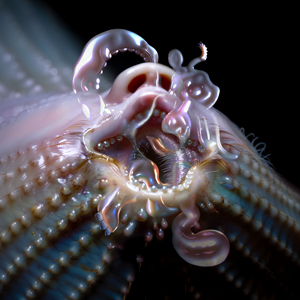OLOF DREIJER REMIX OF BJÖRK AND ROSALÍA’S SINGLE "ORAL" OUT NOW
A TRACK TO SUPPORT ACTION AGAINST INTENSIVE SALMON FARMING
April 10, 2024—Olof Dreijer’s remix of Björk and Rosalía powerful song “Oral” is out now.
“I had a lot of fun making this remix! I really like Rosalia and Bjork’s voices together,” notes Dreijer. “Also this is the first time I play a tamborim that i got as a gift, a small drum usually heard in samba.”
Produced by the artists alongside Sega Bodega, “Oral” marks the first collaboration between Björk and Rosalía.
The song dates back two decades — first written by Björk between 1997’s Homogenic and 2001’s Vespertine, the track was lost to her archives after feeling like it wasn’t the right fit for an album. Björk rediscovered the song after being reminded of its name whilst on tour in Australia in March 2023, the same month a report was released about the devastating impact of poorly regulated, Norwegian-owned commercial salmon farming operations on Iceland’s native ecosystems.
After deeply resonating with the cause, and as a passionate campaigner and protester for much of her life, Björk enlisted Rosalía to help bring the song to life and in turn raise awareness of the issue.
Listen to “Oral” remix here.
You can learn more about Icelandic Fish Farming from the Icelandic Wildlife Fund.
Photos by Veiga Grétarsdóttir, which she took at the fish farms in Iceland, can be found here.
AN ANIMAL WELFARE DISASTER ON A SCALE NEVER PREVIOUSLY SEEN
The man who told Börsen last week that he thinks that Björk does lack knowledge of the way Norwegian salmon companies operate is Stein Ove Tveten, the CEO of Arctic Fish, a salmon farming company that is under police investigation in Iceland. The MOWI owned Arctic Fish was reported to the police by The Icelandic Food and Veterinary Authority in September. If charged and convicted Tveten could, along with board members, face up to a two years sentence behind bars in Iceland.
Recent events
In his short interview Tveten said that the salmon farmers "don't recognize themselves in" Björk's description of the industry. We know that bad memories are often suppressed, but to move forward it's usually better to deal with them. For that reason we want to help Tveten recall what has happened in the last ten weeks on his watch as the CEO of Arctic Fish. Hopefully he will be able to learn to recognize himself. Late August it was reported that Arctic Fish had found two tears on a net pen in Patreksfjörður fjord in Iceland's Westfjords. Tveten and the other directors at the company did not know how many fish they had lost. What they did know and had to confirm when prompted by the The Icelandic Food and Veterinary Authority was that Arctic Fish had not conducted the mandatory underwater surveillance at the pen for more than three months. Later it surfaced that Arctic Fish had also neglected proper maintenance of the lights installed in the sea pens during the darkest months of the year to prevent maturation during the production cycle of the salmon.
The consequences of how Tveten's company operates are grave for Iceland's wild salmon. Escapees from Arctic Fish have now been found in more than 40 rivers across Iceland. This is considered among the biggest environmental disasters in Iceland's history.
And Tveten and Arctic Fish have been breaking other bad records too. Last week the company finished, with Salmar-owned company Arnarlax, culling around one million fish for animal feed due to severe infestation of sea lice in their Westfjords sea pens. An “animal welfare disaster” on a scale never previously seen said one veterinary expert. “The lesions don’t get much worse than this,” said another.
The Norwegian modus operandi
This is how the Norwegian salmon companies operate. Their equipment and farming technology were imported to Iceland, the CEOs were imported from Norway and the bad manners of this terrible industry too.
The world is starting to realise that salmon farming in open net pens is built on terrible suffering and death. The business needs scale and scale brings enormous numbers of parasites, diseases and high mortality of the farmed animals.
Last year 58 million salmon died in Norwegian sea pens. Three million died in pens in the fjord's of Iceland. In both countries the mortality rate was 15 to 20 percent. This cruelty is literally written into the business model. It's a feature, not a bug.
This has to stop. We will make it stop.
On behalf of AegisWatch
Björk
Benedikta Guðrún Svavarsdóttir (Vá - an association for the protection of a fjord)
Jón Kaldal (The Icelandic Wildlife Fund)
Hrund Atladóttir
Katrín Oddsdóttir
Sverrir Páll Sverrisson
Valgerður Árnadóttir
PROTECT EARTH AND ITS CREATURES - OR PERISH WITH THEM
Thank you all for your generous support of the AEGIS campaign against intensive fish farming in Iceland. Your generous donations have not only propelled our initiatives in Iceland but have also helped draw attention to similar campaigns globally, with similar resistance movements happening in the UK, Norway, South America, and beyond. While we've made significant strides, there's still much to be done. For those eager to contribute further, please consider donating to our registered charity via this link. To learn more about our campaign's objectives and ongoing efforts, visit our website. Your support fuels our mission for a healthier planet and better animal welfare.
Thank you – Björk and the AEGIS team
For more information, please contact Carla Sacks, Krista Williams
at Sacks & Co., 212.741.1000.
Björk
www.bjork.com
www.twitter.com/bjork
www.facebook.com/bjork
www.instagram.com/bjork
www.bjorktour.com
